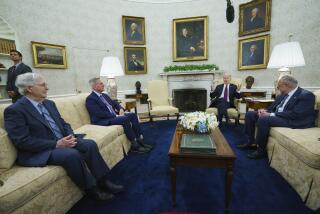One year later, political battle rages over stimulus’ effectiveness
Reporting from Washington — One year after launching the largest federal economic stimulus program in American history, a fiercely partisan political battle continued to rage over its effectiveness even as fresh data showed the economy continuing to make a gradual, if halting, recovery.
In what has become a predictable pattern, Democratic and Republican leaders in Washington marked the Wednesday anniversary by sniping at each other’s claims about the $787-billion package of tax cuts and spending known as the Recovery Act.
Defending the stimulus, President Obama said that “one year later, it is largely thanks to the Recovery Act that a second Depression is no longer a possibility.”
He said again that the stimulus had saved or created 2 million jobs and was on track to add 1.5 million more this year, figures in line with some private economic estimates and the assessment of the nonpartisan Congressional Budget Office.
But those estimated benefits tend to be overshadowed by the fact that the economy has lost more than 4 million jobs in the last year while unemployment is hovering near 10%.
Republican lawmakers stepped up their attacks on the stimulus plan, calling it wasteful and ineffective.
House Minority Leader John A. Boehner (R-Ohio) issued a report that included a list of questionable projects funded by the stimulus and expressed concern over soaring budget deficits, which some people fear will trigger hyperinflation eventually.
More than half of the stimulus money has yet to be spent, and Vice President Joe Biden said that work on roads, rails and other infrastructure projects would expand significantly this year.
But surveys indicate that many Americans doubt that the Recovery Act has had a big effect on Main Street, and the public has expressed growing concerns about rising government debt amid the intense political fighting and gridlock in Washington.
Rep. Gary G. Miller (R-Diamond Bar) said that’s what he was hearing from his constituents. Miller also complained that the Senate had yet to take up his bill to help communities hurt by the housing crisis, even though the House passed the measure last spring.
“The Senate just hasn’t been doing its job,” he said.
Miller’s take on the stimulus package was no better. It hasn’t been working, he said. “I think it would be better to take the balance of that and pay down the debt.”
The Federal Reserve, in its latest economic outlook released Wednesday, said it did not see a threat of inflation any time soon. The central bank projected that inflation would run at a modest 2% or less over the next several years. But economic growth won’t be vigorous either, the Fed said.
The economy is projected to grow 2.8% to 3.5% in 2010, compared with the 5.7% annualized growth rate in the fourth quarter of last year. Unemployment is likely to remain near double digits in 2010 and only slowly decline over the next two years.
With joblessness high and inflation low, policymakers at the central bank are expected to keep interest rates at near zero for an “extended period,” although some Fed officials recently have voiced concerns about the federal budget deficits.
Reflecting public concern over the deficit -- and the GOP’s relentless attacks -- Obama on Wednesday named a blue-ribbon commission to explore ways to curb future spending and increase federal revenues. He picked former Republican Sen. Alan Simpson of Wyoming to head the panel.
Liberal think tanks, meanwhile, issued their own stimulus-assessment reports Wednesday.
The Economic Policy Institute noted that the recession began in December 2007 under the Bush administration. By the time Obama was inaugurated 4.4 million jobs had been lost, with 1.5 million more jobs lost by the time the Recovery Act was signed last February.
“Without the more than 2 million jobs generated by the Recovery Act, the unemployment rate would now exceed 11% rather than the 9.7% rate in January,” it said.
Other economic reports Wednesday indicated an uneven recovery.
Factories continued to ramp up production in January, the Fed said, with manufacturing of cars, clothing and computer equipment posting solid gains from the previous month. The Labor Department said last week that manufacturing payrolls rose modestly last month in the first increase in three years.
But a recovery in the hard-hit housing market has yet to take hold. The Commerce Department said new residential permits, an indicator of future construction, declined almost 5% last month from December as builders remained reluctant to launch new projects given the huge pool of potential foreclosures that could further depress home prices.
Many analysts worry that the fragile real estate market will drag down economic growth. Swelling commercial property defaults are weighing on lenders, and the residential market faces additional risks when the extended tax credit program for home buyers expires this June and the Fed halts its purchases of certain securities that have helped keep mortgage rates very low.
More to Read
Get the L.A. Times Politics newsletter
Deeply reported insights into legislation, politics and policy from Sacramento, Washington and beyond. In your inbox three times per week.
You may occasionally receive promotional content from the Los Angeles Times.











